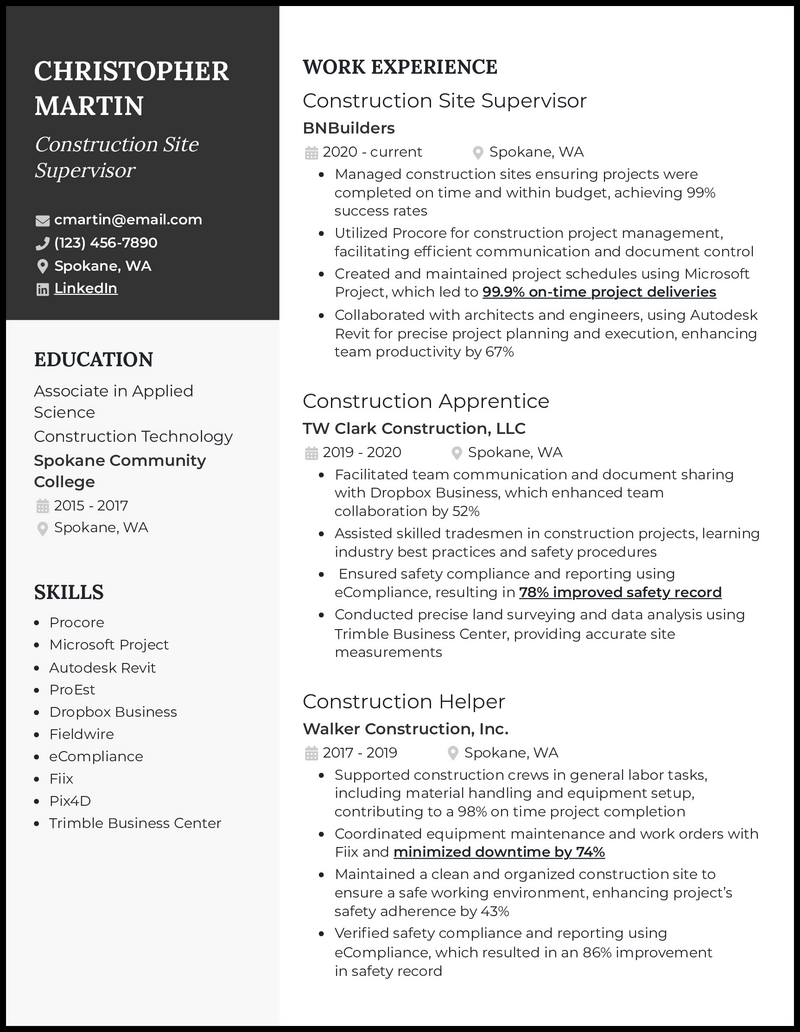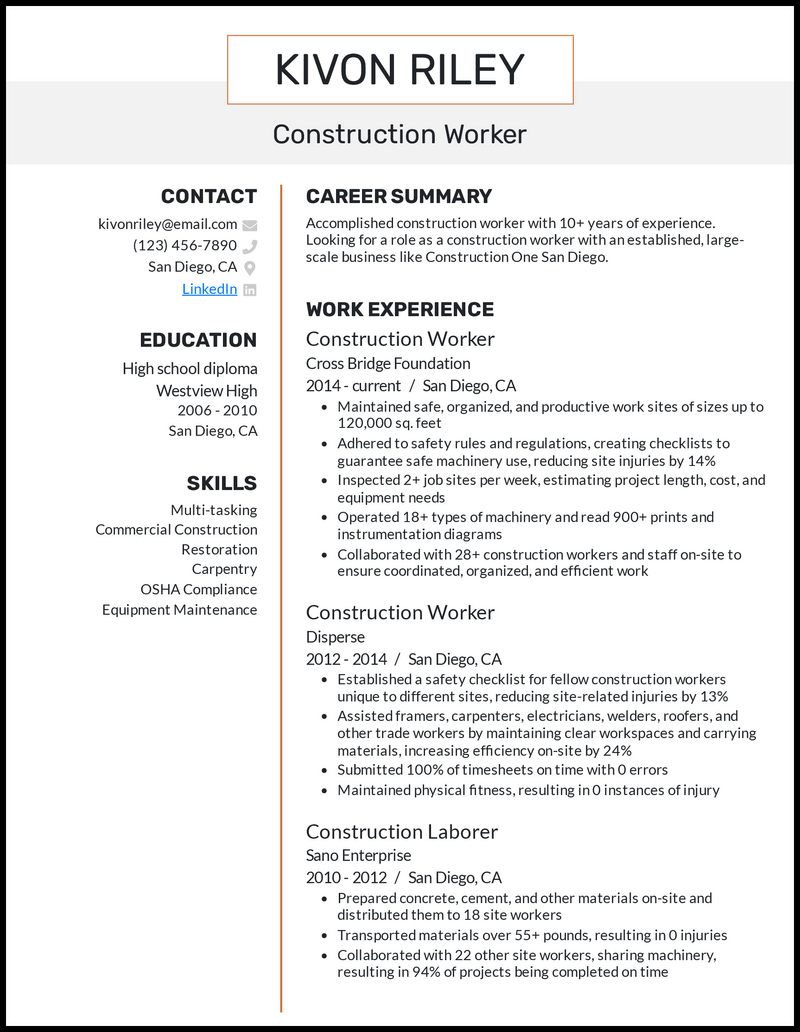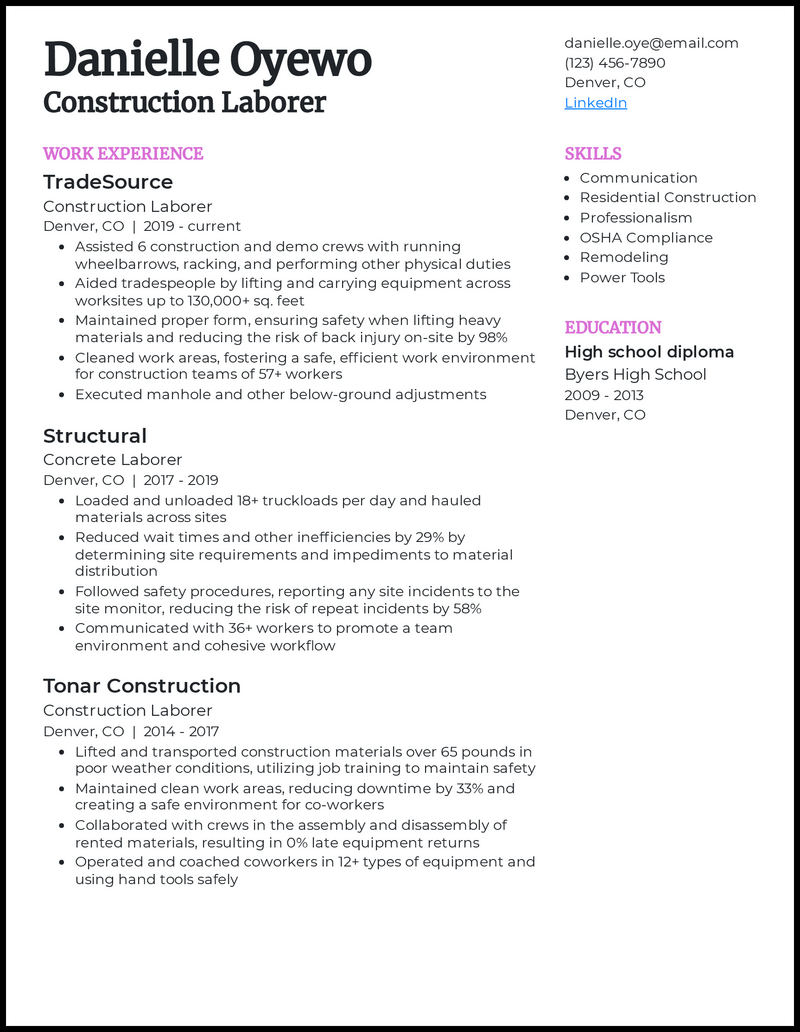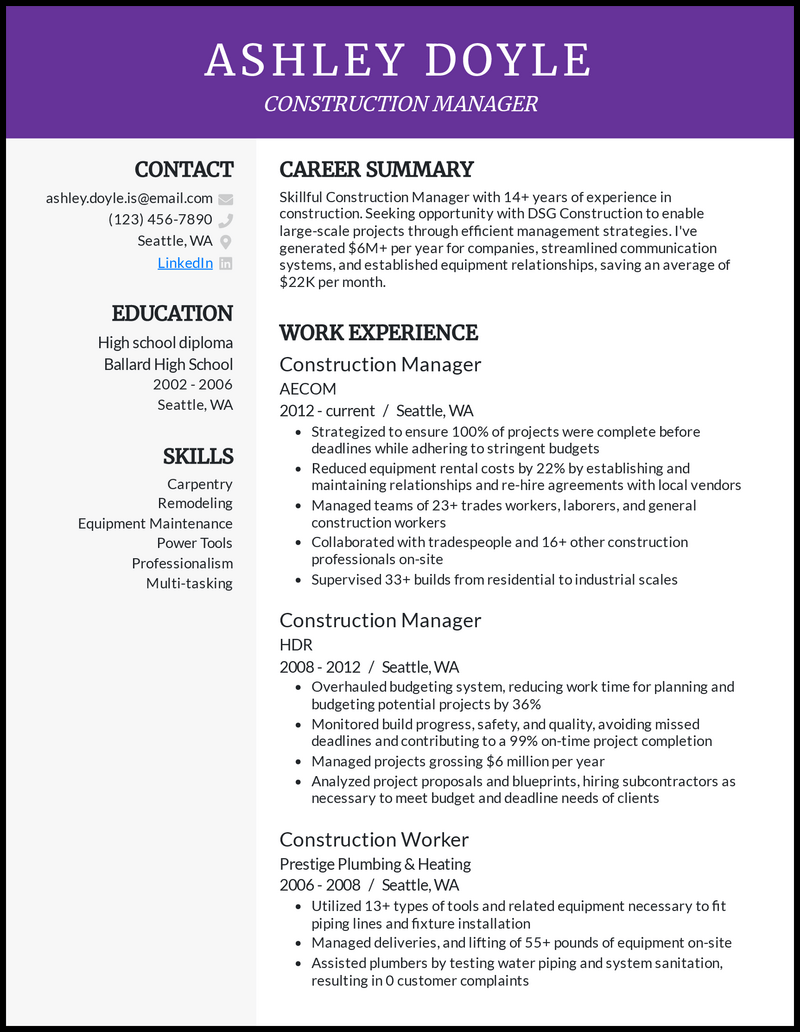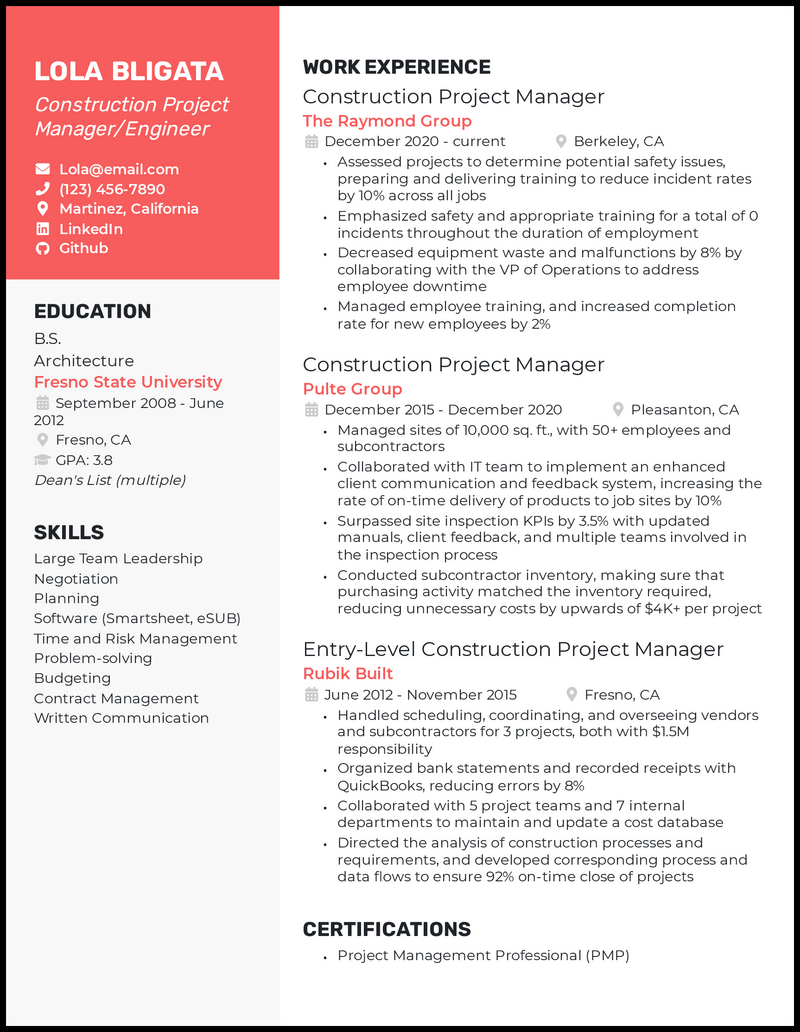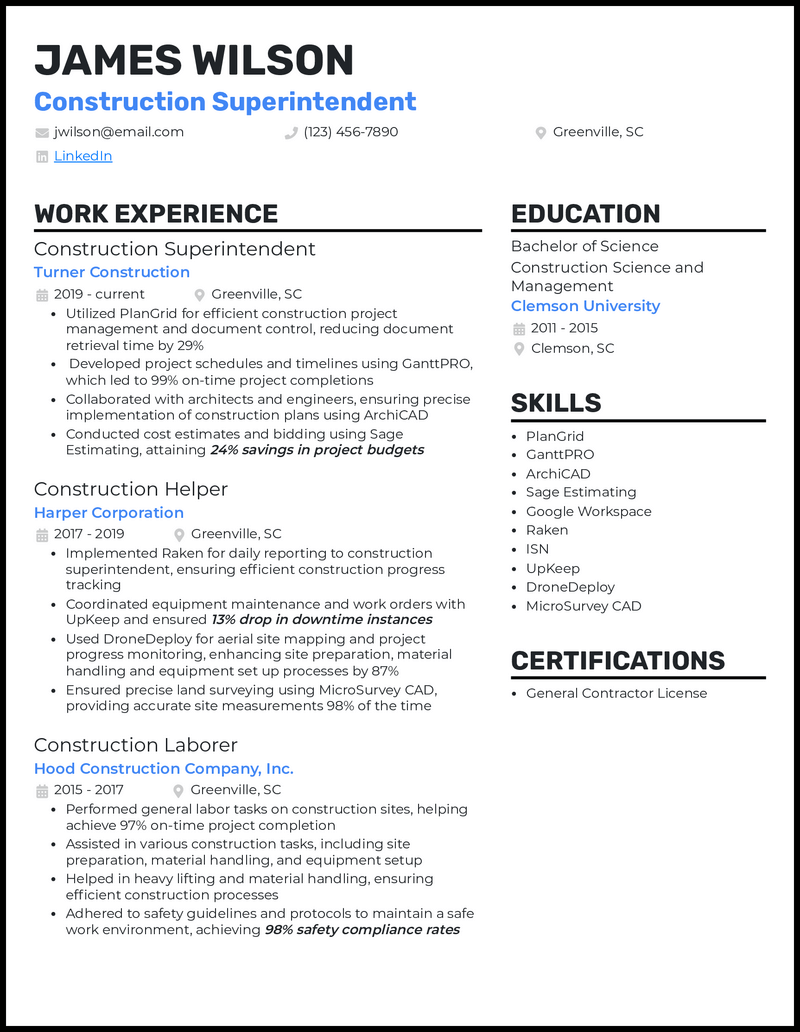You may have years of experience as a construction manager or just be starting on the job. It can be challenging to condense or expand your history into a one-page resume.
You may be wondering how you can best describe your experience, demonstrate your responsibility, and convince hiring managers to interview you in an informative yet concise way.
Fortunately, you don’t have to create a cover letter or make a resume online on your own.
We’ve analyzed numerous construction worker resumes and have discovered what will help you land more interviews in 2025.
We created these nine construction worker resume samples based on what we learned to help construction workers at all experience levels write effective, professional resumes.
Why this resume works
- For a construction project to succeed, there has to be clear efforts from different professionals including engineers, architects, and laborers. This is why your construction resume should show a track record successfully merging the efforts of different professionals to achieve high compliance ratings, and on-time completion of projects.
- Follow this example while writing your piece to stand higher chances of getting shortlisted.
Why this resume works
- When analyzing construction worker resumes, one quality consistently generates the most interviews—quantified metrics.
- You immediately demonstrate your impact as a construction expert by quantifying your contributions whenever possible.
- A rough estimate will do if you don’t have access to exact numbers.
- You must utilize numbers to show your value because, on average, hiring managers will only spend six seconds reviewing your construction worker resume. Numbers effectively convey your experience and encourage employers to slow down and take a second glance.
- One of the problems we see on construction resumes consistently is the use of passive voice and underselling of work experience.
- It can be uncomfortable to write about yourself. Remind yourself that you’re valuable, and access our resume checker to ensure you’re using an active voice to describe your work experience, responsibilities, and achievements.
Why this resume works
- Make sure that each work experience you include contains three to six bullet points. Too few bullet points may cause the hiring manager to question the impact you had, and too many will make your construction laborer’s resume cluttered and cumbersome.
- If you’re having trouble filling in enough bullet points for your work experience, think about how you communicated effectively with co-workers or instances where you worked through lunch. If you had a near-perfect attendance record or worked on an important project, you can include those details.
- Go through your resume and think of ways to quantify as many of your job experiences as possible. Ask yourself how many colleagues you collaborated with, how frequently you attended meetings or trainings, or when you reduced inefficiencies at the construction site.
Why this resume works
- Consider including a resume objective if you’re light on experience. It helps fill up the page but must be worth the space it consumes.
- A worthy objective should drive home your value in a power-packed snapshot of your experience or skills, however limited. It should also be customized to the target company by mentioning their name.
- If you lack much job history, you can include school projects, volunteer experience, internships, or anything that demonstrates your reliability, communication skills, and ability to use power tools.
- If you have an unrelated work history, use it to demonstrate key job skills from the job description.
- Part-time jobs balanced during school display time-management skills and responsibility and should be included if you have limited relevant work to show.
- You can use clever resume formatting tips and tricks to generate a resume that fills an entire page, even with limited expertise. Changing page margins, font, and font size can all help your resume fill a page.
- Remember: Don’t be tempted to use filler words when they’re unnecessary. They waste the hiring managers’ already limited time to review your entry-level construction resume.
- Finally, include metrics. Numbers are especially important on an entry-level resume because they convey that you know your worth and would add value to any company.
Why this resume works
- If you boast 10+ years in the field, consider including a resume summary. Stand out with a glimpse of your best, most specialized qualifications within two-to-three sentences.
- A worthwhile summary will mention the target business by name and showcase your senior years in the industry.
- When you’re a construction manager with many years of experience and multiple job titles, list your roles in reverse-chronological order (with your most recent position listed at the top of your resume).
- This will show employers your most relevant experience first, increasing the likelihood of receiving an interview. Additionally, listing work history this way demonstrates improvement as you advance throughout your career.
- Ensure your resume skills are relevant to the specific job to which you’re applying. Check the job description and hone in on any key skills mentioned.
- You may not realize it, but your skills section is the second most important on your entire construction manager resume. If you fail to include the right skills, your resume may never make it past the Applicant Tracking Systems (ATS) to human eyes.
Why this resume works
- One of the best parts of your construction project manager/engineer resume is the skills section.
- Focus on including a mix of hard and soft skills. Hard skills are highly job-specific, trainable, and measurable, such as Smartsheet software. On the other hand, soft skills can apply across many types of work. Examples include problem-solving, empathy, and communication.
- Hard skills are arguably the most important because they demonstrate a deeper understanding of the job demands, and are more easily proven and objective.
- We recommend including six to ten skills on your resume, which is enough for the hiring team to understand your skillset without crossing over into an overwhelming laundry list.
Why this resume works
- Nothing matters more in construction than ensuring structures meet industry compliance guidelines, and the workers operate under safety standards. These are two things that were clear in this construction superintendent resume that you may want to showcase in yours, too.
- While other aspects such as on-time completion and budget control do matter, you want to demonstrate how well you prioritize structure and safety guidelines.
Why this resume works
- A rather simple way to stand out from any other general construction worker’s resume is by listing down the different types of equipment you’re best skilled at.
- Don’t just list the basics like screwdrivers and drilling sets (though we love those!)—try being more specific. Include your ability to operate the big league equipment like a SawStop PCS31230-TGP252 Professional Cabinet Saw. Fuse these skills with your bullet points and highlight tangible results using them.
Why this resume works
- Your education is not going to be a deal-breaker for a construction role. So, try focusing more on creating impact-based work experience bullet points.
- For instance, look at Matthew’s road construction worker resume. He doesn’t say he’s only flattening roadways but rather emphasizes using a tandem roller to achieve 93% soil compaction. That level of detail shows employers you don’t just smoothen out roads, you make sure they last.




